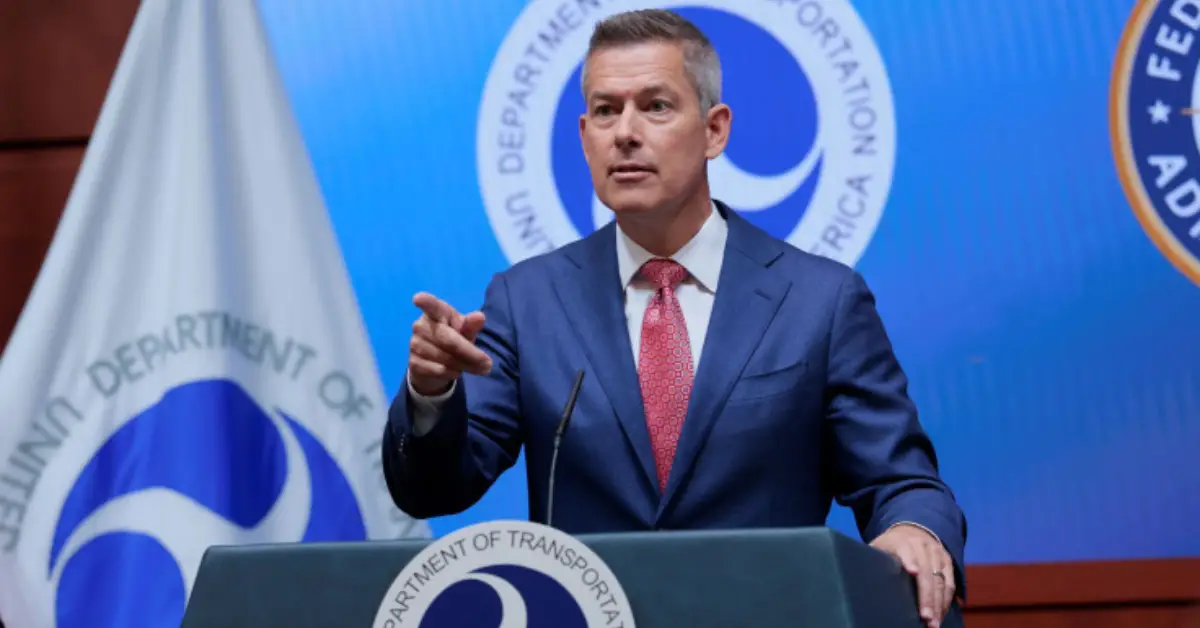US air travel is experiencing major disruptions, and former Congressman Sean Duffy is placing the blame squarely on the Biden administration. With reports of rising delays, cancellations, and an overall chaotic system, Duffy argues that the current administration’s handling of the nation’s air traffic control system is the main factor behind the ongoing crisis.
As passengers face longer waits and more frustration, Duffy’s critique of Biden’s leadership is drawing attention and raising questions about the government’s role in addressing infrastructure issues.
In this article, we’ll explore the state of US air traffic control, the challenges facing the Federal Aviation Administration (FAA), Duffy’s criticisms, and the potential path forward to solve the crisis.
The Growing Crisis in US Air Traffic Control
The US air traffic control system is under intense pressure. Over the past several months, air travelers have experienced widespread delays and cancellations, creating havoc for both passengers and airlines. The issue stems largely from an overburdened air traffic control system that is failing to meet the demands of an increasingly busy airspace.
The Federal Aviation Administration (FAA) oversees the US air traffic control system, managing thousands of flights daily. But with air travel at pre-pandemic levels or higher, the system is struggling to handle the volume. The FAA is dealing with outdated technology, staffing shortages, and a lack of modern infrastructure—all contributing factors to the disruptions seen in airports across the country.
Despite efforts to streamline operations and modernize equipment, the system remains strained. One significant issue has been the shortage of air traffic controllers. The COVID-19 pandemic slowed down hiring and training programs, leaving the system understaffed. In some regions, air traffic controllers are required to work overtime, leading to exhaustion and a higher risk of errors. The lack of adequate personnel exacerbates delays, making it harder to keep flights on schedule.
Sean Duffy’s Criticism of the Biden Administration
Sean Duffy, who served as a Republican Congressman from Wisconsin, has been outspoken in his criticism of the Biden administration’s handling of the US air traffic control crisis. According to Duffy, the administration has failed to address the pressing issues facing the FAA and has not provided enough support to the aviation industry.
Duffy points to the administration’s failure to invest in necessary infrastructure improvements, especially in air traffic control. While Biden has pushed forward with initiatives focused on green energy, social welfare programs, and other priorities, Duffy argues that the lack of focus on air travel infrastructure has caused real-world consequences. Duffy contends that the Biden administration’s economic policies, including its approach to government spending, have put more pressure on industries already struggling to recover from the pandemic.
One of Duffy’s central arguments is that the FAA’s problems are not new but have been worsened by the lack of investment in both technology and staffing. Duffy claims that Biden’s policies have neglected air travel safety and efficiency, leading to the current crisis. He suggests that a more focused effort on modernizing the FAA’s operations and addressing staffing shortages could have prevented much of the chaos that is currently affecting the nation’s air travel system.
Challenges Faced by the FAA
The FAA is tasked with overseeing the operations of US air traffic control, but the agency has been facing significant challenges for years. As air travel demand has increased, the FAA’s resources have remained relatively stagnant. The agency’s budget has not kept up with the growing need for modernization and expanded services.
Outdated radar and communication systems are just one example of the technology problems that are plaguing the FAA. Air traffic controllers rely on these systems to coordinate flights and ensure safety, but much of the equipment is decades old. Modernizing this technology is crucial, but it requires significant funding and long-term planning.

The shortage of air traffic controllers is another major issue. The FAA has struggled to recruit and train new controllers, and many of the existing ones are nearing retirement. The recruitment process is slow, and it takes years to fully train a new controller. In the meantime, air traffic controllers who are already in the workforce are working overtime, sometimes managing more flights than they can handle.
Duffy argues that the Biden administration has not done enough to address these issues, and he believes that the government needs to prioritize these problems before they get worse.
Political Implications and Partisan Divide
Duffy’s criticisms of the Biden administration reflect a broader partisan divide in US politics. The Republican former Congressman sees the issues at the FAA as symptomatic of larger governance challenges under Biden’s leadership.
He believes that the Biden administration’s priorities, which often focus on social spending and climate change initiatives, have left critical infrastructure projects like air traffic control underfunded and neglected.
On the other hand, the Biden administration has defended its record on infrastructure and transportation. The White House has emphasized its efforts to invest in rebuilding America’s roads, bridges, and airports, pointing to the passage of the bipartisan infrastructure bill. However, critics like Duffy argue that these investments have not been enough to address the immediate needs of the FAA or modernize air traffic control systems.
While both parties agree that US infrastructure needs attention, the debate comes down to how those resources are allocated and which areas should receive priority. Duffy’s criticisms are likely to be amplified by Republicans who see the air traffic control crisis as a way to point out the administration’s shortcomings in managing critical sectors.
What Needs to Be Done
The challenges facing US air traffic control are complex and require immediate action. A comprehensive solution will need to address staffing shortages, upgrade technology, and invest in new infrastructure. Modernizing the FAA’s operations is crucial to ensuring the safety and efficiency of air travel in the US.
First and foremost, the FAA must recruit and train more air traffic controllers. A significant investment in training programs and incentives for workers in the industry is essential to addressing the controller shortage. Additionally, funding for technological upgrades should be prioritized to ensure that the FAA can keep up with growing air traffic demands.
Another key component of a solution will involve bipartisan cooperation. While partisan politics may continue to shape the debate, it is clear that air traffic control is an issue that requires collaboration between the federal government, industry stakeholders, and lawmakers. Both parties must work together to find common ground and secure the necessary resources to modernize the air traffic control system.
Conclusion
The ongoing crisis in US air traffic control is a serious problem that affects millions of passengers and airlines every year. Sean Duffy’s criticisms of the Biden administration shed light on the deeper issues facing the FAA and the broader transportation sector. While Duffy’s claims may be politically charged, they highlight the pressing need for infrastructure investment and modernization in the US air travel system.
As the Biden administration continues to focus on other policy priorities, it is essential that lawmakers recognize the critical state of air traffic control. Addressing staffing shortages, upgrading technology, and securing funding for the FAA should be top priorities to ensure that US air travel remains safe, efficient, and reliable. With bipartisan support and focused action, it is possible to overcome these challenges and restore confidence in the nation’s air traffic control system.
Disclaimer: This article has been meticulously fact-checked by our team to ensure accuracy and uphold transparency. We strive to deliver trustworthy and dependable content to our readers.




